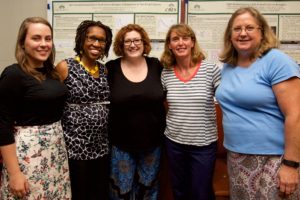Debra Blake Semmler, Physics, East Mecklenburg High School
Final Unit(pdf) Implementing Teaching Standards(pdf)
Synopsis:
I always think of science as being universal for all people. It does not have a political or cultural bias. The law of gravity is the same for all objects, not just people. It does not discriminate; when we trip, we all fall to the ground at the same speed. Is the teaching of science across all cultural boundaries also the same? Will strategies that we routinely use in the US to teach science work in other countries? After spending three weeks in Rwanda sharing science at two different girls schools, I think the teaching of science is the same; we are teaching the same concepts the same formula and use many of the same sources. What needs to change in developing nations and in the US is an increase of the inclusion of technology as a tool to give instruction and analysis. Good use of technology promotes discussion of experimental data to develop students’ critical thinking skills as opposed to memorization of facts or cookbook lab activates that many classroom now use in all countries. This curriculum unit describes how to move from a lecture based classroom instruction to more discussion and analysis of data based science classroom.










 Home
Home